#mistakes are human
Text

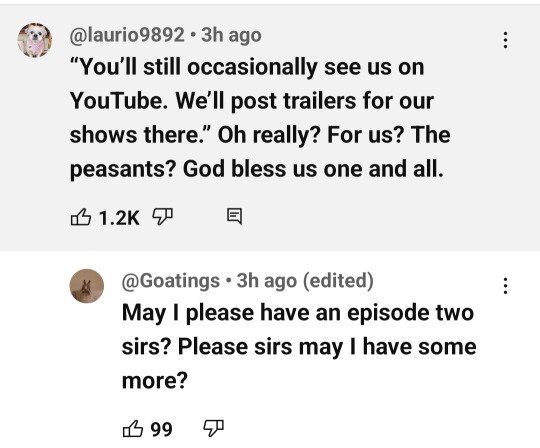



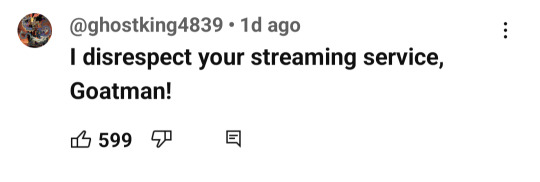


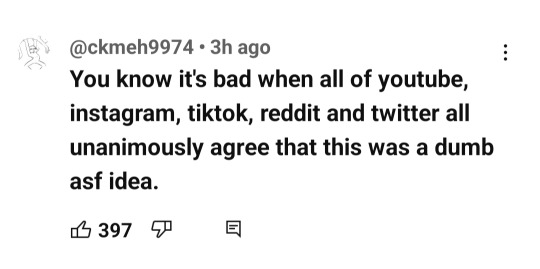

Just a few of the comments from YouTube that amused me.
#watcher#watcher entertainment#the ghoul boys#ryan and shane#ryan bergara#shane madej#steven lim#youtube comments#hopefully they'll learn and get better#we're all human and all make mistakes but moat of us dont do it on this public of a stage
4K notes
·
View notes
Text
One thing for those who have watched The Boy and The Heron or will watch it. The Japanese title for it is How Do You Live? And Miyazaki stated he was leaving it for his grandson, saying, "Grandpa is moving onto the next world soon but he is leaving behind this film".
The deaths of contemporaries and friends such as Satoshi Kon and Isao Takahata and also the expected successor of Yoshifumi Kondo were things that have always weighed heavily on the back of Miyazaki's mind.
He recognizes the industry and the occupation for how soul crushing it was, grinding up either the spirit or the physical body of those who work in it. He loves and hates the industry he stands on the peak of and fully recognizes how it will probably be the death of him. And he knows it'll leave him unable to say a lot of things to his Grandson.
So How Do You Live? is a lesson. For his grandson. For himself. For his two sons. And probably for anyone else willing to pay attention.
Hayao Miyazaki is a flawed man that makes things so important to so many people. And I think more than any other film of his, in this you get to pull back the curtain a bit and see him at work. And what should be this giant unblemished titan can be seen for what he is, a sad old man who had higher hopes for himself and has even higher hopes for the people he makes his work for.
It's a beautiful thing to see another's humanity in their work. To look past the artifice and glam of commercialized art and find humans behind it. And humans willing to show their humanity and mortality is even rarer. And something to be celebrated. So when you watch it. Or if you've watched it already. Understand that this film is Miyazaki kneeling down, weary after years of weaving dreams and making mistakes, reaching out and saying to you that he hopes you can do better. It's an old man who's made all the mistakes of the world passing it on to you, hoping you do better, and making sure you know it's okay if you don't.
How do you Live? By making mistakes. By messing up. But still moving forward. And still reaching out.
#the boy and the heron#how do you live#hayao miyazaki#i love you old man#i know you'll be back but if we're talking to each other through screens then thanks#if the wind rises was him exposing his mistakes then this is his apology#i really dislike the popularization of ideas like “parasocial relationships” and “seperate the art from the artist” and how it seeps into#the discussion of art. While people should be maintaining a detachment from people they don't know I think blunting arts impact by not#acknowledging the human behind it is a disservice to art. And you lose the beauty behind someone as flawed as you making something beautiful
7K notes
·
View notes
Text
You will not be able to fully understand or relate to people with differing disabilities. Being disabled yourself does not give you immunity to having biases, ableist ideas, or misunderstandings about people with different disabilities. We all have unique struggles and things that help/hurt us, and it's both beautiful and frustrating. It's what makes our community strong but it also can lead to infighting and miscommunication. Be aware of other disabilities, listen to people outside your specific condition. Don't talk over others and if you do apologize and learn from it. Don't assume because YOU haven't encountered something that it means anyone talking about it is lying or exaggerating. We can still have each other's backs without having the same experiences. We can do this. Take my hand.
#wrenfea.exe#disability#disabilities#cripplepunk#neuropunk#madpunk#and yes that includes me. i am human and i have and will make mistakes#what matters is how you act after making the mistake#when in doubt ASK POLITELY#dont like run up to a stranger and bager them with questions#but find someone (like me!) who is open and willing to answering questions about their disability experience#as long as you ask nicely im pretty chill
2K notes
·
View notes
Text

Awesome winter family moment
#my rart#csm#chainsaw man#power csm#denji csm#aki hayakawa#who wants to hear about who denji & power are borrowing their winter clothes from#its aki#theyre borrowing his clothes#thanks for listening#denji absolutely beams them w that snowball anyway#powers mistake was thinking that denji wouldnt attack if she were usinf aki as a human shield#and well aki. aki shouldve known better truthfully
2K notes
·
View notes
Text
“Humans in the loop” must detect the hardest-to-spot errors, at superhuman speed
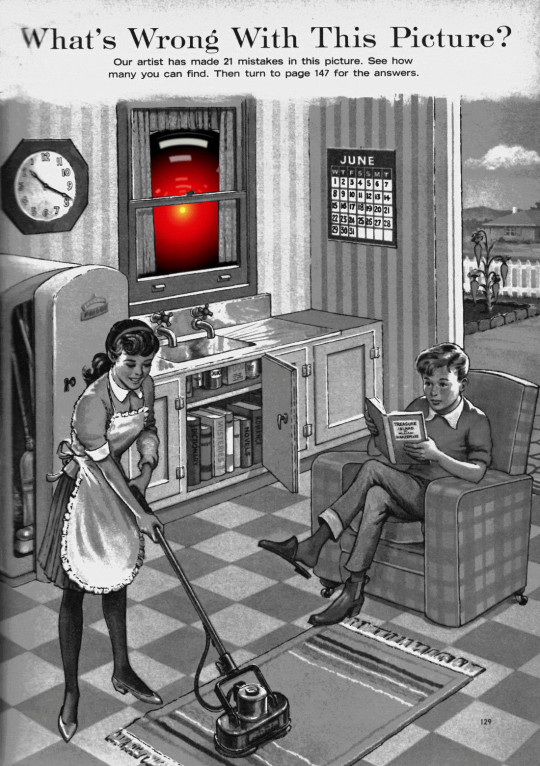
I'm touring my new, nationally bestselling novel The Bezzle! Catch me SATURDAY (Apr 27) in MARIN COUNTY, then Winnipeg (May 2), Calgary (May 3), Vancouver (May 4), and beyond!

If AI has a future (a big if), it will have to be economically viable. An industry can't spend 1,700% more on Nvidia chips than it earns indefinitely – not even with Nvidia being a principle investor in its largest customers:
https://news.ycombinator.com/item?id=39883571
A company that pays 0.36-1 cents/query for electricity and (scarce, fresh) water can't indefinitely give those queries away by the millions to people who are expected to revise those queries dozens of times before eliciting the perfect botshit rendition of "instructions for removing a grilled cheese sandwich from a VCR in the style of the King James Bible":
https://www.semianalysis.com/p/the-inference-cost-of-search-disruption
Eventually, the industry will have to uncover some mix of applications that will cover its operating costs, if only to keep the lights on in the face of investor disillusionment (this isn't optional – investor disillusionment is an inevitable part of every bubble).
Now, there are lots of low-stakes applications for AI that can run just fine on the current AI technology, despite its many – and seemingly inescapable - errors ("hallucinations"). People who use AI to generate illustrations of their D&D characters engaged in epic adventures from their previous gaming session don't care about the odd extra finger. If the chatbot powering a tourist's automatic text-to-translation-to-speech phone tool gets a few words wrong, it's still much better than the alternative of speaking slowly and loudly in your own language while making emphatic hand-gestures.
There are lots of these applications, and many of the people who benefit from them would doubtless pay something for them. The problem – from an AI company's perspective – is that these aren't just low-stakes, they're also low-value. Their users would pay something for them, but not very much.
For AI to keep its servers on through the coming trough of disillusionment, it will have to locate high-value applications, too. Economically speaking, the function of low-value applications is to soak up excess capacity and produce value at the margins after the high-value applications pay the bills. Low-value applications are a side-dish, like the coach seats on an airplane whose total operating expenses are paid by the business class passengers up front. Without the principle income from high-value applications, the servers shut down, and the low-value applications disappear:
https://locusmag.com/2023/12/commentary-cory-doctorow-what-kind-of-bubble-is-ai/
Now, there are lots of high-value applications the AI industry has identified for its products. Broadly speaking, these high-value applications share the same problem: they are all high-stakes, which means they are very sensitive to errors. Mistakes made by apps that produce code, drive cars, or identify cancerous masses on chest X-rays are extremely consequential.
Some businesses may be insensitive to those consequences. Air Canada replaced its human customer service staff with chatbots that just lied to passengers, stealing hundreds of dollars from them in the process. But the process for getting your money back after you are defrauded by Air Canada's chatbot is so onerous that only one passenger has bothered to go through it, spending ten weeks exhausting all of Air Canada's internal review mechanisms before fighting his case for weeks more at the regulator:
https://bc.ctvnews.ca/air-canada-s-chatbot-gave-a-b-c-man-the-wrong-information-now-the-airline-has-to-pay-for-the-mistake-1.6769454
There's never just one ant. If this guy was defrauded by an AC chatbot, so were hundreds or thousands of other fliers. Air Canada doesn't have to pay them back. Air Canada is tacitly asserting that, as the country's flagship carrier and near-monopolist, it is too big to fail and too big to jail, which means it's too big to care.
Air Canada shows that for some business customers, AI doesn't need to be able to do a worker's job in order to be a smart purchase: a chatbot can replace a worker, fail to their worker's job, and still save the company money on balance.
I can't predict whether the world's sociopathic monopolists are numerous and powerful enough to keep the lights on for AI companies through leases for automation systems that let them commit consequence-free free fraud by replacing workers with chatbots that serve as moral crumple-zones for furious customers:
https://www.sciencedirect.com/science/article/abs/pii/S0747563219304029
But even stipulating that this is sufficient, it's intrinsically unstable. Anything that can't go on forever eventually stops, and the mass replacement of humans with high-speed fraud software seems likely to stoke the already blazing furnace of modern antitrust:
https://www.eff.org/de/deeplinks/2021/08/party-its-1979-og-antitrust-back-baby
Of course, the AI companies have their own answer to this conundrum. A high-stakes/high-value customer can still fire workers and replace them with AI – they just need to hire fewer, cheaper workers to supervise the AI and monitor it for "hallucinations." This is called the "human in the loop" solution.
The human in the loop story has some glaring holes. From a worker's perspective, serving as the human in the loop in a scheme that cuts wage bills through AI is a nightmare – the worst possible kind of automation.
Let's pause for a little detour through automation theory here. Automation can augment a worker. We can call this a "centaur" – the worker offloads a repetitive task, or one that requires a high degree of vigilance, or (worst of all) both. They're a human head on a robot body (hence "centaur"). Think of the sensor/vision system in your car that beeps if you activate your turn-signal while a car is in your blind spot. You're in charge, but you're getting a second opinion from the robot.
Likewise, consider an AI tool that double-checks a radiologist's diagnosis of your chest X-ray and suggests a second look when its assessment doesn't match the radiologist's. Again, the human is in charge, but the robot is serving as a backstop and helpmeet, using its inexhaustible robotic vigilance to augment human skill.
That's centaurs. They're the good automation. Then there's the bad automation: the reverse-centaur, when the human is used to augment the robot.
Amazon warehouse pickers stand in one place while robotic shelving units trundle up to them at speed; then, the haptic bracelets shackled around their wrists buzz at them, directing them pick up specific items and move them to a basket, while a third automation system penalizes them for taking toilet breaks or even just walking around and shaking out their limbs to avoid a repetitive strain injury. This is a robotic head using a human body – and destroying it in the process.
An AI-assisted radiologist processes fewer chest X-rays every day, costing their employer more, on top of the cost of the AI. That's not what AI companies are selling. They're offering hospitals the power to create reverse centaurs: radiologist-assisted AIs. That's what "human in the loop" means.
This is a problem for workers, but it's also a problem for their bosses (assuming those bosses actually care about correcting AI hallucinations, rather than providing a figleaf that lets them commit fraud or kill people and shift the blame to an unpunishable AI).
Humans are good at a lot of things, but they're not good at eternal, perfect vigilance. Writing code is hard, but performing code-review (where you check someone else's code for errors) is much harder – and it gets even harder if the code you're reviewing is usually fine, because this requires that you maintain your vigilance for something that only occurs at rare and unpredictable intervals:
https://twitter.com/qntm/status/1773779967521780169
But for a coding shop to make the cost of an AI pencil out, the human in the loop needs to be able to process a lot of AI-generated code. Replacing a human with an AI doesn't produce any savings if you need to hire two more humans to take turns doing close reads of the AI's code.
This is the fatal flaw in robo-taxi schemes. The "human in the loop" who is supposed to keep the murderbot from smashing into other cars, steering into oncoming traffic, or running down pedestrians isn't a driver, they're a driving instructor. This is a much harder job than being a driver, even when the student driver you're monitoring is a human, making human mistakes at human speed. It's even harder when the student driver is a robot, making errors at computer speed:
https://pluralistic.net/2024/04/01/human-in-the-loop/#monkey-in-the-middle
This is why the doomed robo-taxi company Cruise had to deploy 1.5 skilled, high-paid human monitors to oversee each of its murderbots, while traditional taxis operate at a fraction of the cost with a single, precaratized, low-paid human driver:
https://pluralistic.net/2024/01/11/robots-stole-my-jerb/#computer-says-no
The vigilance problem is pretty fatal for the human-in-the-loop gambit, but there's another problem that is, if anything, even more fatal: the kinds of errors that AIs make.
Foundationally, AI is applied statistics. An AI company trains its AI by feeding it a lot of data about the real world. The program processes this data, looking for statistical correlations in that data, and makes a model of the world based on those correlations. A chatbot is a next-word-guessing program, and an AI "art" generator is a next-pixel-guessing program. They're drawing on billions of documents to find the most statistically likely way of finishing a sentence or a line of pixels in a bitmap:
https://dl.acm.org/doi/10.1145/3442188.3445922
This means that AI doesn't just make errors – it makes subtle errors, the kinds of errors that are the hardest for a human in the loop to spot, because they are the most statistically probable ways of being wrong. Sure, we notice the gross errors in AI output, like confidently claiming that a living human is dead:
https://www.tomsguide.com/opinion/according-to-chatgpt-im-dead
But the most common errors that AIs make are the ones we don't notice, because they're perfectly camouflaged as the truth. Think of the recurring AI programming error that inserts a call to a nonexistent library called "huggingface-cli," which is what the library would be called if developers reliably followed naming conventions. But due to a human inconsistency, the real library has a slightly different name. The fact that AIs repeatedly inserted references to the nonexistent library opened up a vulnerability – a security researcher created a (inert) malicious library with that name and tricked numerous companies into compiling it into their code because their human reviewers missed the chatbot's (statistically indistinguishable from the the truth) lie:
https://www.theregister.com/2024/03/28/ai_bots_hallucinate_software_packages/
For a driving instructor or a code reviewer overseeing a human subject, the majority of errors are comparatively easy to spot, because they're the kinds of errors that lead to inconsistent library naming – places where a human behaved erratically or irregularly. But when reality is irregular or erratic, the AI will make errors by presuming that things are statistically normal.
These are the hardest kinds of errors to spot. They couldn't be harder for a human to detect if they were specifically designed to go undetected. The human in the loop isn't just being asked to spot mistakes – they're being actively deceived. The AI isn't merely wrong, it's constructing a subtle "what's wrong with this picture"-style puzzle. Not just one such puzzle, either: millions of them, at speed, which must be solved by the human in the loop, who must remain perfectly vigilant for things that are, by definition, almost totally unnoticeable.
This is a special new torment for reverse centaurs – and a significant problem for AI companies hoping to accumulate and keep enough high-value, high-stakes customers on their books to weather the coming trough of disillusionment.
This is pretty grim, but it gets grimmer. AI companies have argued that they have a third line of business, a way to make money for their customers beyond automation's gifts to their payrolls: they claim that they can perform difficult scientific tasks at superhuman speed, producing billion-dollar insights (new materials, new drugs, new proteins) at unimaginable speed.
However, these claims – credulously amplified by the non-technical press – keep on shattering when they are tested by experts who understand the esoteric domains in which AI is said to have an unbeatable advantage. For example, Google claimed that its Deepmind AI had discovered "millions of new materials," "equivalent to nearly 800 years’ worth of knowledge," constituting "an order-of-magnitude expansion in stable materials known to humanity":
https://deepmind.google/discover/blog/millions-of-new-materials-discovered-with-deep-learning/
It was a hoax. When independent material scientists reviewed representative samples of these "new materials," they concluded that "no new materials have been discovered" and that not one of these materials was "credible, useful and novel":
https://www.404media.co/google-says-it-discovered-millions-of-new-materials-with-ai-human-researchers/
As Brian Merchant writes, AI claims are eerily similar to "smoke and mirrors" – the dazzling reality-distortion field thrown up by 17th century magic lantern technology, which millions of people ascribed wild capabilities to, thanks to the outlandish claims of the technology's promoters:
https://www.bloodinthemachine.com/p/ai-really-is-smoke-and-mirrors
The fact that we have a four-hundred-year-old name for this phenomenon, and yet we're still falling prey to it is frankly a little depressing. And, unlucky for us, it turns out that AI therapybots can't help us with this – rather, they're apt to literally convince us to kill ourselves:
https://www.vice.com/en/article/pkadgm/man-dies-by-suicide-after-talking-with-ai-chatbot-widow-says

If you'd like an essay-formatted version of this post to read or share, here's a link to it on pluralistic.net, my surveillance-free, ad-free, tracker-free blog:
https://pluralistic.net/2024/04/23/maximal-plausibility/#reverse-centaurs

Image:
Cryteria (modified)
https://commons.wikimedia.org/wiki/File:HAL9000.svg
CC BY 3.0
https://creativecommons.org/licenses/by/3.0/deed.en
#pluralistic#ai#automation#humans in the loop#centaurs#reverse centaurs#labor#ai safety#sanity checks#spot the mistake#code review#driving instructor
725 notes
·
View notes
Photo

traitor
#idk the context i was just in a Mood this weekend#aka wanted to do lineart for some godforsaken reason#mistakes were made#mlp#mlp humanized#twilight sparkle#sunset shimmer#twiset#my art#the sketch for this request was too good to not finish lol
4K notes
·
View notes
Text
Prompt in Memes 5
Once more, have a prompt entirely in memes because I'm too lazy to properly write one right now lol.






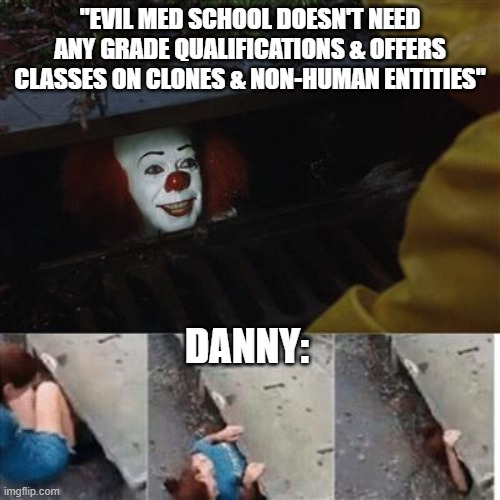
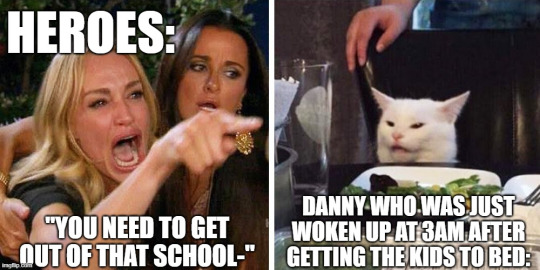
#dcxdp#dpxdc#prompts#De aged dan#de aged ellie#dad danny#mom danny#Fuck it make this a Hazmat Au too with a hint of eldritch Phantom form#Hence why no one realizes Danny Fenton & Phantom Dark are different people#No Danny is not ghost king he's just a little shit#Jazz is in Metropolis & Danny is around depending on where the “field trips” are#Sometimes he's in Gotham because Scarecrow or Ivy offers a lecture#Most of the time they're in Central though because it's safest for the baby villains in the making lol#Danny is taking classes for both medical stuff (thx Frostbite) and engineering#A couple of time travelling villains ADORE him and his kids lol#“So u a monsterfucker?” “What” “I mean I saw that ghost hero & I'm just sayin that's not human y'know-”#Tucker stop laughing at him#Tucker and Sam and Val are also in the same villain school but taking different classes#Save for Tucker also being in an engineering class#Sam is fighting for that Ivy internship#Val is in the specialized Anti-Hero course that focuses on teen heroes who are done with that bs#She got in by telling them (not lying) that she's going to take down a branch of government even if she has to blow the whole thing up#Evil College Au#Danny made a mistake & now everyone thinks that he Val Sam AND Tuck were in a relationship with Phantom at some point#Eveery other student now refers to them as the Petty Exes#memes#meme
1K notes
·
View notes
Text
My DCA design updated + Eclipse
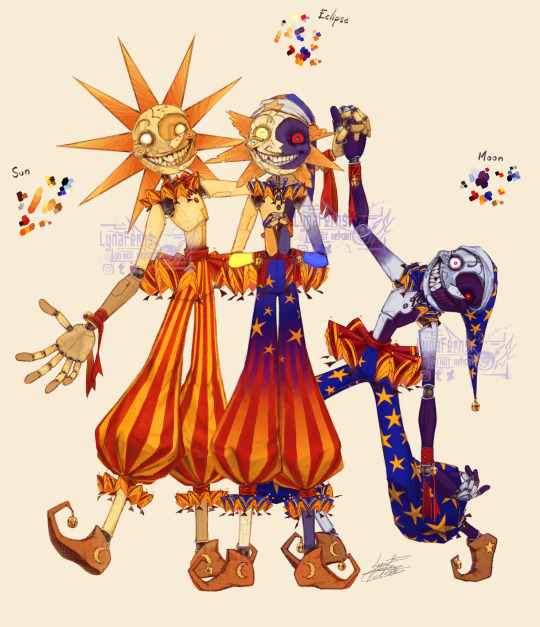
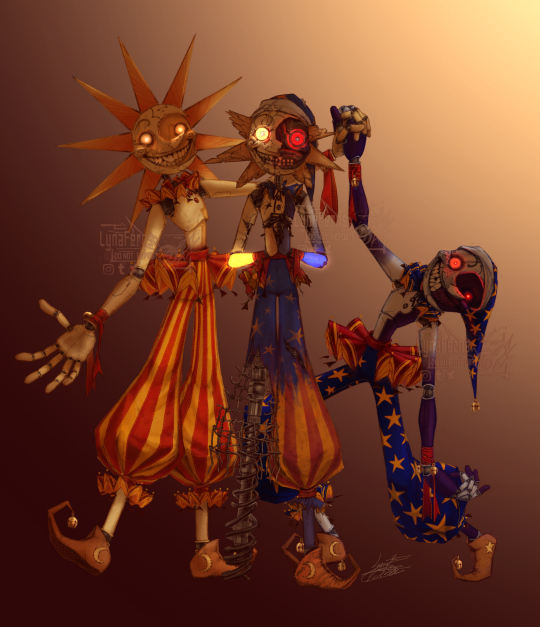
Separated ver. + comentary under the cut
Not quite content with eclipses end result but eh, idk if I'll draw eclipse much so...
I've been wanting for a while to update my refs for my designs of them. The old ones got... old. It's funny how I simplificated some aspects of their designs in order to complicated others haha.
ngl I got tired at some point and just wanted to finish
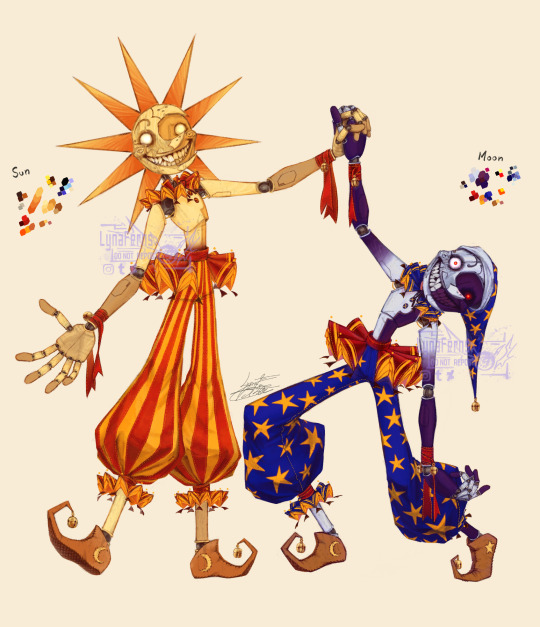
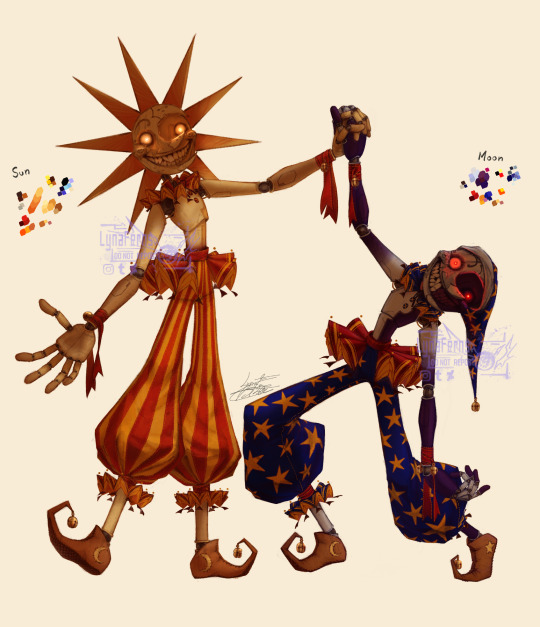
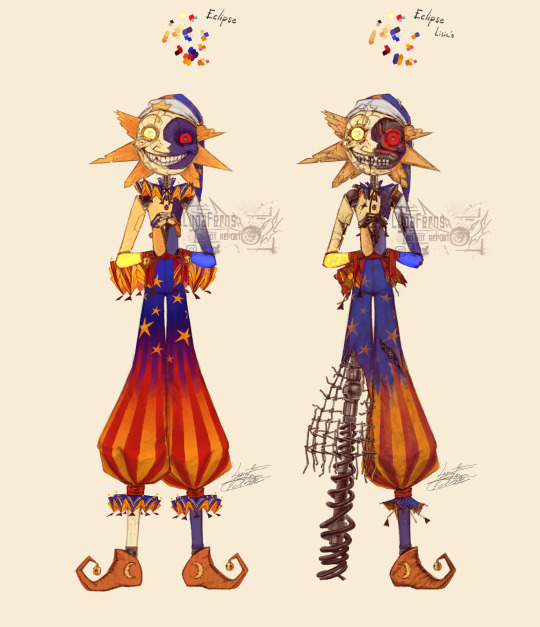
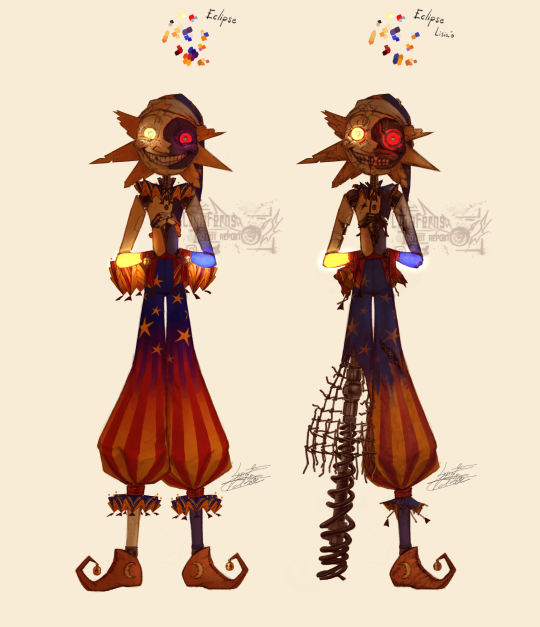

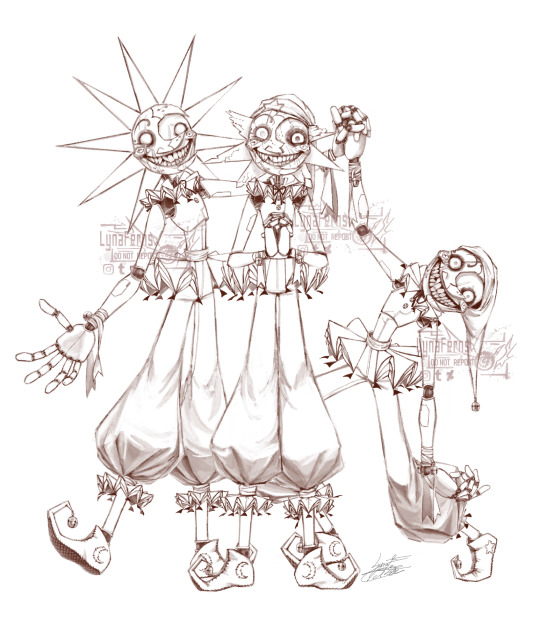
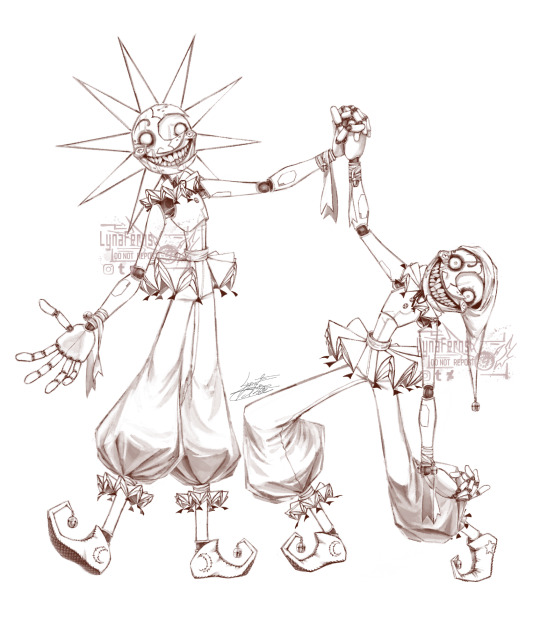
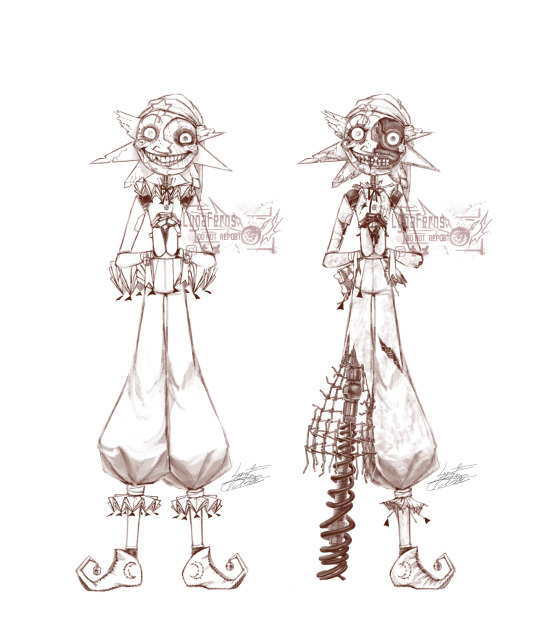
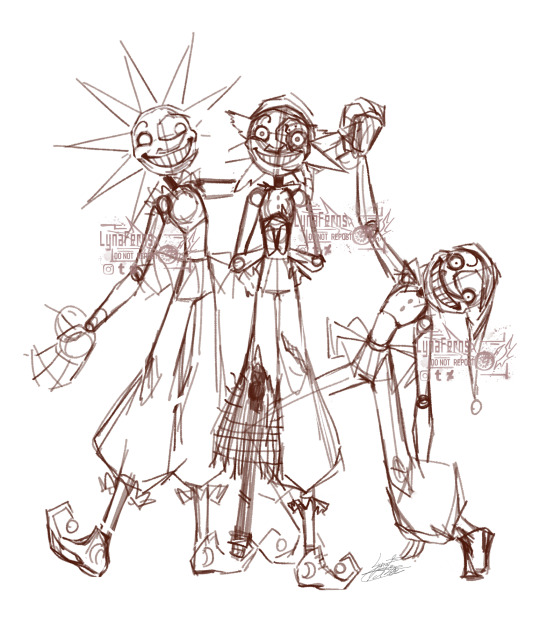
#I left Sun and Moons hand holding for the end because I thought it was gonna be the hardest part to draw and it turned out the easiest :/#hardest was positioning moons arms#my art#drawing#digital art#fnaf security breach#fnaf sun#fnaf moon#fnaf eclipse#fnaf daycare attendant#fnaf dca#fnaf sundrop#fnaf moondrop#dunno what im doin next#I have silly ideas for out of contex scenes for my AUs#but also want to do that elf/human redesign#aaaaa overwhelming myself#if you saw this on the star bench discord server I. uh. um didn't commit any mistake#and didn't have to go through all the files correcting it#nope
2K notes
·
View notes
Text

REAL GOOBERS
#fionna and cake#simon petrikov#fionna the human#fionna campbell#fanart#fionna and cake fanart#fionna and cake art#art#HEEYYY I FINALLY DREW THEM !!!!#also repost I made a mistake#lol
1K notes
·
View notes
Text

welcome!!
this is Penny and Agatha's blog - you knew them as Pomni and Ragatha, all those months performing in the Circus. they're living together now - and the real world has been an adjustment. ask them anything!!
asks can be directed at characters or the creator (me, @raggedytiger lol)
no super duper explicit stuff! jokes are welcome!
this will primarily be ragapom(/agapenny? p... pegatha?) -centric but you can totally mention other characters! havent settled on any solid designs for them yet lol
yes i know she looks like reagan. yes i know she looks like kobeni. i'm sorry
you can interact with them but the anons/messages themselves probably won't be super central to any lore like they are in some other wonderful askblogs like ask the rag dolly! (the anon/influencer thing is awesome)
i can't guarantee how fast i'll get to your ask! i am a busy student, i'm sorry!!
have fun ^_^
this is just an intro post, once this gets going i might end up adding more info!
#tadc#the amazing digital circus#tadc fanart#tadc ask blog#ragapom#jesterdoll#tadc humanization#tadc gijinka#buttonblossom#pomni x ragatha#ragatha x pomni#pomni#ragatha#agatha & penny#agatha#penny#watch me notice 50000 mistakes in this post alone 3 minutes after i finally post it
697 notes
·
View notes
Text
“When toxic behavior is portrayed as romantic, it’s problematic. When problematic behavior is portrayed as a character flaw for a character to work through, it’s good storytelling.”
Katsuki Bakugou, my friends.
His behavior was problematic but never once portrayed as romantic at the same time. Katsuki said and did awful abusive things, and he also chose to be better when he was given the chance. If you’re still hung up on chapter 1 Katsuki now then I don’t think you’ve been reading the same story I have.
I can’t speak for everyone, but I’m not shipping Izuku with an irredeemable abuser. I’m shipping him with his most important person. His narrative foil. His childhood friend who made awful mistakes and then made it right when he saw he was wrong. The person Izuku looks up to and strives to emulate, despite their past struggles.
Bakudeku is so good because of how flawed these boys are, and how hard they’ve worked to get over it, and how much they matter to each other after it all
#perfect stories about perfect people who never do anything wrong are usually boring#stories about growth and mistakes and redemption and forgiveness and progress are lit#bkdk#bakudeku#the quote is from cinema therapy on YouTube btw#love them so much#they look at media and talk about what is and isn’t good from a real life human perspective#and boy did this quote slap me in the face#anyway this is my thought literally any time anyone says something about shipping Izuku with his abuser#if he was still being abused then I get it#but he’s not#and saying he needs protection from Katsuki is honestly doing his character dirty#and this is not to say that every situation with an abuser and a victim should turn out romantic#obviously not#the world is not black and white and neither are people#sometimes you have to get yourself out and never look back and that is valid and healthy#but sometimes you’re talking about two boys in a manga who literally cannot stop thinking about how good and incredible the other is#bro I get it#surface level chapter/episode 1 Katsuki is literally the worst#but his glow up has been literally meteoric
415 notes
·
View notes
Text









🥟: “thank you for giving us our 1st place at mucore. thanks to stay it feels like my empty day was filled up. more than being thankful about the first place, im more thankful about the love you give us. i feel it more lately, that im living thankfully everyday” [translation source]
#hyunjin#skz#stray kids#bystay#gifs#my human shaped eraser.. he takes away all the mistakes ans negativity of the day just by his presence#I LOVE UUUUUUUUU U U UU U U UU#hmmmm i think it’s so precious that he always hops on to live to personally say thank u and talk to us when something great happens..#😔 my sentimental bub…
711 notes
·
View notes
Text
16 June 22
Good Morning! “The lesson is that you can still make mistakes and be forgiven.” - Robert Downey, Jr.
We are all human and NONE of us are perfect. We all make mistakes. The important part is that we learn from our mistakes and not to keep repeating them. To ANYONE that I may have hurt while making a mistake, I profoundly apologize for my actions. It was likely because of something going on in my head at the time. I always have a lot going on there and it can be very difficult to see that what I am doing is wrong at that time. Later it will likely keep me up at night as it will join all my other past mistakes that tend to replay in my head while I'm trying to sleep. I need to learn to forgive myself. I can forgive others, but myself is a whole separate matter. So my wish for each of you today is that you can learn from your mistakes and forgive yourself for making them.
0 notes
Text

we back at it again
#dead plate#i cant draw humans this is my only way to provide to the fandom#giving me access to the files was a mistake#sorry this one is quite shittily edited btw
797 notes
·
View notes
Text
hey wait i just had a thought. what would Data's handwriting look like. do you think whenever he has to handwrite he just perfectly prints New Times Roman in size 14 onto the paper in three seconds or something. wait imagine if he wrote in Comic Sans
#star trek#star trek tng#data soong#star trek data#data star trek#would he though#data writing in barcodes or wingdings is extremely funny to me#imagine if they all had to like sign their names on a piece of paper for some reason#and everyone has like normal handwriting with curves and mistakes and imperfections#and then data is just perfect new times roman in the middle#do you think he would mimic the imperfections of human handwriting so his doesn't look so jarring#answering my own question: yes he would
306 notes
·
View notes
